Cananga odorata (Ylang-Ylang) is a tropical tree endemic to Southeast Asia, including Indonesia, Malaysia, and the Philippines. It is famous for its beautiful blooms and the essential oil extracted from them. Because of its possible mood-boosting and skin-nourishing effects, Ylang-Ylang essential oil is popular in aromatherapy and skincare. This blog delves deeper into how Ylang-Ylang can improve both your mood and your skin.
Discovering Ylang-Ylang: From Traditional Use to Modern Skincare
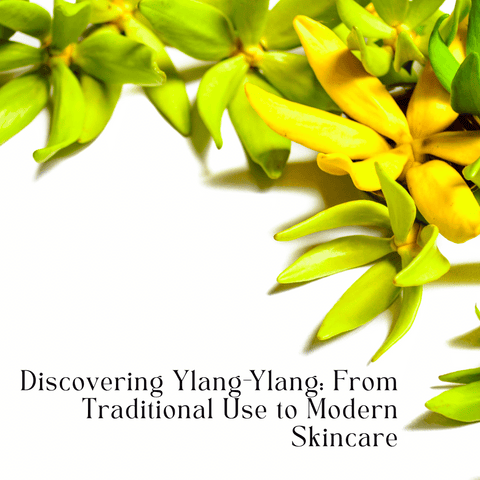
Discovering the benefits of Ylang-Ylang in both traditional and modern skincare is an intriguing trip that demonstrates the adaptability of this beautiful treasure. Let's take a look at the history and evolution of Ylang-Ylang, from its traditional use to its use in modern skincare. In its native Southeast Asian locations, ylang-ylang has a long history of use in traditional medicinal and cultural practices. Ylang-Ylang flowers were originally used for a variety of functions in nations such as Indonesia, the Philippines, and Malaysia. The potential advantages of Ylang-Ylang have received renewed attention as scientific study has advanced and natural cosmetics and aromatherapy have grown in popularity. To reap the advantages of Ylang-Ylang oil or its derivatives, modern skincare products such as cleansers, moisturisers, serums, and masks frequently include it. Due to its strength, adequate dilution and formulation are essential to avoid skin irritation.
The History and Extraction of Ylang-Ylang Oil
The history and production of Ylang-Ylang oil are inextricably linked to the culture and traditions of its native Southeast Asian regions. The oil is extracted from the blooms of the Cananga odorata tree, which is native to Indonesia, Malaysia, and the Philippines. The blog provides an overview of Ylang-Ylang oil's history and extraction technique. In the locations where it grows, ylang-ylang has a long history of use in traditional practices and cultural ceremonies. "Ylang-Ylang" comes from the Tagalog term "ilang-ilang," which means "wilderness" or "rare." The blooms of the Ylang-Ylang tree were prized for their lovely smell and were frequently used for a variety of purposes. The varied grades of Ylang-Ylang oil allow for a variety of applications in perfumery, aromatherapy, and cosmetics, catering to a variety of preferences and smell intensities. Ylang-Ylang oil is still widely used in the fragrance, aromatherapy, and skincare industries today, preserving its historical relevance while adapting to new practices and demands.
Understanding the Key Components of Ylang-Ylang Oil
Cananga odorata oil (Ylang-Ylang oil) is a complex essential oil with a wide range of chemical components that contribute to its distinct aroma and potential medicinal effects. These components combine to give Ylang-Ylang oil its distinct aroma and possible advantages in aromatherapy and cosmetics. Linalool, geranyl acetate, -caryophyllene, farnesene, methyl benzoate, eugenol, sesquiterpenes, monoterpenes, and esters are some of the major components present in Ylang-Ylang oil. The renowned sweet, floral, and exotic perfume of Ylang-Ylang oil is due to the unique mix of these components. Ylang-Ylang oil is frequently used in aromatherapy to promote relaxation, relieve tension, and raise mood. It can be found in skincare products that try to balance sebum production, moisturise the skin, and potentially address mild skin irritations. It should be noted that essential oils are very concentrated and strong, and their effects can vary depending on individual sensitivities and health problems. If you're thinking about using Ylang-Ylang oil for aromatherapy or skincare, do a patch test first and consult with a competent aromatherapist or skincare professional.
Ylang-Ylang and Skin Health: A Beautiful Connection
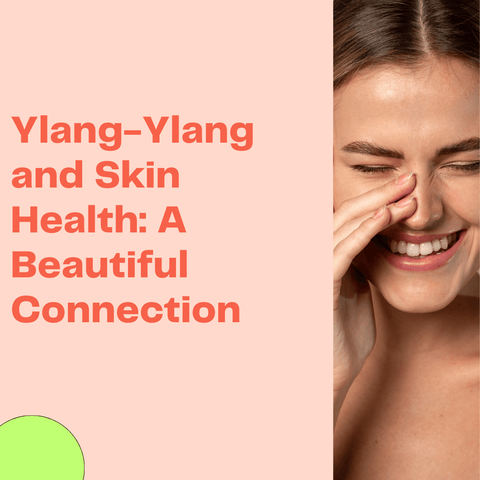
The relationship between Ylang-Ylang essential oil and skin health is indeed lovely, thanks to its potential advantages for a variety of skin types and ailments. This aromatic oil obtained from the blossoms of the Ylang-Ylang tree (Cananga odorata) has a variety of qualities that can help promote healthier, more vibrant skin. Here's a closer look at the relationship between Ylang-Ylang and skin health, including sebum production balancing, moisturising and hydrating, antioxidant protection, relaxing and soothing, aromatherapeutic advantages, sensory experience, dilution, and proper application. Incorporating Ylang-Ylang oil into your skincare routine can improve the overall health and appearance of your skin. However, if you have sensitive skin, allergies, or any preexisting skin conditions, you should perform a patch test and consult with a dermatologist or skincare professional before using Ylang-Ylang oil or any essential oils on your skin.
How Ylang-Ylang Nourishes and Protects Your Skin
Because of its unique blend of components that provide numerous skincare advantages, Ylang-Ylang oil (Cananga odorata) has the capacity to nourish and protect the skin. When used correctly and in moderation, Ylang-Ylang oil can help achieve healthier, more beautiful skin. Ylang-Ylang oil can nourish and protect your skin in the following ways:
-
Sebum Regulation and Balancing: The efficacy of Ylang-Ylang oil to control sebum production is well established. Ylang-Ylang oil can help balance the skin's natural oil production, whether you have oily or dry skin. It can help manage excess sebum production in oily skin, reducing shine and the probability of clogged pores. Ylang-Ylang oil can provide the required hydration for dry skin, preventing flakiness and dry patches.
-
Moisturization and Hydration: Ylang-Ylang oil can be used to nourish and moisturise the skin. It can help lock in moisture, reduce water loss, and keep the skin supple and silky when diluted and applied topically. This is especially important for keeping the skin looking healthy and reducing dryness.
-
Antioxidant Protection: Ylang-Ylang oil's antioxidant capabilities can help protect the skin from the destructive effects of free radicals and environmental stresses. Pollution and UV radiation, for example, are stressors that lead to premature aging and skin damage. Ylang-Ylang oil's antioxidants help to neutralise these toxic substances, boosting general skin health and a more youthful appearance.
-
Soothing and Calming: The relaxing and calming qualities of Ylang-Ylang oil extend to the skin. It has the potential to minimise redness, irritation, and inflammation, making it a viable alternative for those with sensitive or easily irritated skin. Topically applying Ylang-Ylang oil may help soothe sensitive skin and produce a more even skin tone.
-
Aromatherapeutic Benefits: The aroma of Ylang-Ylang oil has been demonstrated to improve mood and emotions. When used in skincare products, the aroma of Ylang-Ylang oil can help with relaxation and stress alleviation during your skincare routine. Reduced stress can indirectly enhance your skin's health because stress has been linked to a variety of skin problems.
-
Sensory Experience: Including Ylang-Ylang oil in your skincare routine can create a pleasant sensory experience. Its sweet, floral aroma can improve your spirits and make self-care more fun and luxurious.
-
Dilution and Caution: It's important to remember that Ylang-Ylang oil is highly concentrated and should be used with caution. Before applying it to your skin, always dilute it appropriately in a carrier oil. Before using it on wider parts of your skin, perform a patch test to check for any adverse reactions.
The Role of Ylang-Ylang in Treating Skin Conditions
Ylang-Ylang oil (Cananga odorata) has long been used and is sometimes considered in modern natural healthcare for its ability to treat a variety of skin issues. While scientific research on Ylang-Ylang's particular effects on skin conditions is limited, and individual reactions can vary, here are several ways that Ylang-Ylang oil may play a role in treating various skin conditions:
-
Acne and Oily Skin: The ability of Ylang-Ylang oil to regulate sebum production makes it potentially advantageous for people with oily or acne-prone skin. It may help prevent clogged pores, decrease breakouts, and enhance the overall appearance of the skin by reducing excess oil production. However, care must be taken to appropriately dilute the oil and avoid using it excessively, since this could cause skin irritation.
-
Inflammation and Irritation: The soothing and calming characteristics of Ylang-Ylang oil may help alleviate skin inflammation and irritation. It could be used to treat minor skin redness, itching, and irritation. Diluted Ylang-Ylang oil may provide relief for mild dermatitis or eczema.
-
Antioxidant Protection: The antioxidants found in Ylang-Ylang oil may help protect the skin from oxidative stress and environmental damage. This protection may aid in the maintenance of healthier skin and the prevention of premature aging.
-
Stress-Related Skin Issues: Stress can have a bad impact on the skin, causing acne, eczema flare-ups, and general poor skin health. The aromatherapeutic properties of ylang-ylang may help to alleviate skin problems exacerbated by stress by increasing relaxation and decreasing stress-related hormone changes.
-
Skin Sensitivity: When suitably diluted, Ylang-Ylang oil can be used to soothe sensitive skin and provide relief from moderate irritation or redness. Its relaxing properties may help relieve some of the discomfort associated with sensitive skin.
-
Aromatherapeutic Benefits: Ylang-Ylang oil's scent has the potential to improve mood and promote relaxation. This can help with stress reduction, which in turn can help with skin health. Stress reduction can help avoid stress-related skin problems and promote a healthy complexion.
The Impact of Ylang-Ylang on Mood and Stress Levels
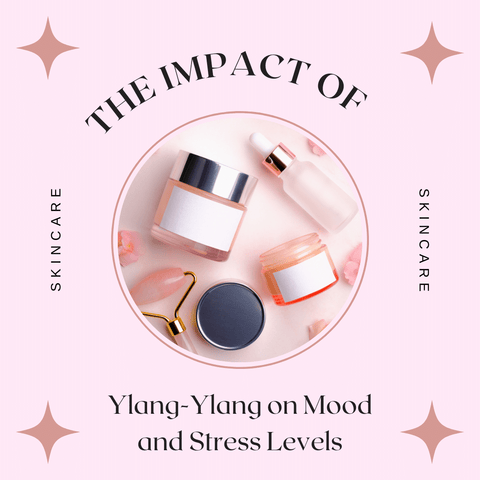
Ylang-Ylang essential oil (Cananga odorata) is a popular choice in aromatherapy and holistic wellness practices due to its potential effect on mood and stress levels. The fragrant chemicals included in Ylang-Ylang oil can have a significant impact on the mind and emotions. Relaxation and Calming, Mood Enhancement, Stress Reduction, Aromatherapeutic Effects, Sensory Stimulation, and Aphrodisiac Qualities are some of the ways Ylang-Ylang oil may influence mood and stress. It's vital to note that everyone reacts differently to aromatherapy. While many people find Ylang-Ylang oil to be extremely calming and mood-enhancing, others may react differently due to individual preferences and sensitivities.
To benefit from Ylang-Ylang oil's potential mood-boosting and stress-relieving properties, you can:
-
To create a calming atmosphere in your living space, diffuse a few drops of Ylang-Ylang oil in an essential oil diffuser.
-
Add a drop or two of Ylang-Ylang oil to your bathwater for a relaxing and aromatic soak.
-
Use a diluted Ylang-Ylang oil solution with a carrier oil for a gentle massage or as part of a self-care routine.
As with any essential oil, Ylang-Ylang oil should be used cautiously and in moderation. Some people may be sensitive to its aroma, therefore, if you have any worries or underlying health conditions, conduct a patch test and talk with a competent aromatherapist.
Ylang-Ylang: A Powerful Tool in Aromatherapy
In the world of aromatherapy, Ylang-Ylang (Cananga odorata) is regarded as a potent and flexible instrument. Its distinct aroma and potential therapeutic effects have made it a popular choice among aromatherapists and those looking for natural ways to improve their well-being. Here are some of the reasons why Ylang-Ylang is so popular in aromatherapy:
-
Mood Enhancement: Ylang-Ylang essential oil is well-known for its uplifting effects. Its sweet and floral perfume can elevate your emotions, relieve grief or anxiety, and promote emotional equilibrium. It is frequently employed to produce a calming and harmonising environment, which can have a favorable effect on mood.
-
Stress Reduction: The calming and soothing properties of Ylang-Ylang oil can aid in the reduction of tension and anxiety. Inhaling its perfume might cause neurotransmitters like serotonin to be released, contributing to feelings of relaxation and well-being. It's a useful technique for reducing tension and fostering a sense of calm.
-
Relaxation and Sleep Aid: Ylang-Ylang oil is frequently used to enhance relaxation and improve sleep quality due to its calming and soothing properties. Inhaling its perfume before going to bed can help to relax the mind, relieve restlessness, and prepare the body for a good night's sleep.
-
Aphrodisiac Properties: Because of its seductive and exotic perfume, Ylang-Ylang oil is considered an aphrodisiac in aromatherapy. It has the potential to increase romantic feelings and promote intimacy, making it a powerful tool for relationship enhancement.
-
Grounding and Emotional Balance: The perfume of Ylang-Ylang oil has the ability to ground and stabilise emotions. It can be especially beneficial for people undergoing emotional difficulty since it can assist in alleviating anxiety, impatience, and mood swings.
-
Aromatherapeutic Rituals: Aside from its individual effects, Ylang-Ylang oil is frequently used in aromatherapeutic rituals to promote self-care and awareness. Diffusing Ylang-Ylang oil, adding it to bathwater, or using it in massage can turn mundane tasks into moments of relaxation and renewal.
-
Complementary Blends: Aromatherapists frequently include Ylang-Ylang oil in personalised essential oil blends to address specific needs. It can be blended with other essential oils to have synergistic effects that address a wide range of emotional and psychological issues.
How Ylang-Ylang Helps Enhance Mood and Relieve Stress
The capacity of Ylang-Ylang essential oil (Cananga odorata) to improve mood and ease stress has made it a popular choice in aromatherapy and holistic wellness practices. Its aromatic components have an immediate effect on the limbic system, which is involved in emotions, memory, and stress response. Here's how Ylang-Ylang oil improves mood and relieves stress:
-
Aromatic Influence on Emotions: The aroma of Ylang-Ylang oil is described as sweet, floral, and exotic. When inhaled, these aromatic chemicals can excite the olfactory system and have a direct effect on the limbic system of the brain. The limbic system is in charge of controlling emotions, memory, and hormone reactions.
-
Regulation of Neurotransmitters: The perfume of Ylang-Ylang oil can cause the release of neurotransmitters like serotonin and endorphins. Serotonin is known as the "feel-good" neurotransmitter because it leads to sensations of well-being and happiness. Endorphins are natural pain relievers that can also cause relaxation and pleasure.
-
Stress Reduction and Cortisol Levels: The oil of ylang-ylang has the capacity to lower the body's stress reaction. It can help reduce the synthesis of cortisol, the stress hormone, by inducing relaxation and lowering anxiety levels. Lowering cortisol levels improves overall stress reduction and can generate a sense of calm.
-
Relaxation and Sedative Properties: Ylang-Ylang oil contains sedative compounds that can aid in relaxation and tranquility. Inhaling its aroma can induce a state of calm, making it an effective tool for stress management and relaxation, especially before bedtime.
-
Heart Rate and Blood Pressure: It has been demonstrated that aromatherapy with Ylang-Ylang oil has a positive effect on heart rate and blood pressure. Inhaling the aroma can reduce heart rate and blood pressure, resulting in a state of relaxation and stress relief.
-
Aromatherapy Techniques: Ylang-Ylang oil can be used in a variety of aromatherapy techniques to improve mood and relieve stress, including:
-
Diffusion: A few drops of Ylang-Ylang oil in an essential oil diffuser can disperse its aroma into the air, creating a calming and harmonising environment.
-
Inhalation: Inhaling the aroma directly from the bottle or from a tissue infused with Ylang-Ylang oil can provide immediate stress relief and promote a positive mood.
-
Massage: Use diluted Ylang-Ylang oil in massage to relax muscles, relieve tension, and promote emotional well-being.
-
Self-Care Rituals: Using Ylang-Ylang oil in self-care rituals like taking a soothing bath with a few drops of the oil or using it during meditation can create a mindful and relaxing experience that improves mood and reduces stress.
Incorporating Ylang-Ylang into Your Skincare Routine
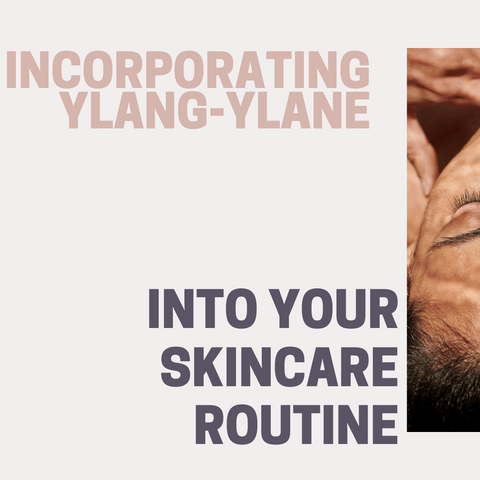
Including Ylang-Ylang oil in your skincare routine may provide benefits for a variety of skin types and ailments. However, it is critical to use this oil safely and correctly to avoid any negative reactions. Here's how to incorporate Ylang-Ylang oil into your skincare routine:
-
Dilution: Ylang-Ylang oil is potent and should always be diluted before applying it to your skin. The standard recommendation is to add 1-2% of Ylang-Ylang oil to a carrier oil or skincare item.
-
Patch test: Before using Ylang-Ylang oil on a larger area of skin, carry out a patch test. Apply a diluted solution of the oil to a small area of your inner arm and wait 24 hours to ensure no adverse reactions occur.
-
Cleansing: You can enhance the sensory experience of cleansing by adding a drop or two of Ylang-Ylang oil to your gentle face cleanser. This might also help to calm you down during your skincare regimen.
-
Toner: Make your own facial toner by combining Ylang-Ylang oil with hydrosol (flower water) or witch hazel. This can help balance the pH of the skin and provide a refreshing spritz.
-
Moisturiser: To enhance the benefits of your favorite moisturiser or face oil, add a few drops of Ylang-Ylang oil. The oil's ability to balance sebum production can be especially beneficial for those with combination or oily skin.
-
Face Masks: You can boost the effectiveness of your face masks by mixing in a few drops of Ylang-Ylang oil. This can help with hydration and relaxation while masking.
-
Massage: A gentle face massage with diluted Ylang-Ylang oil is possible. This can assist in increasing circulation, relaxing facial muscles, and improving skincare product absorption.
-
Aromatherapy Experience: The aroma of Ylang-Ylang oil can provide an aromatherapeutic experience during your skincare routine. Inhaling its scent while applying your products can help you relax and reduce stress.
-
Custom Blends: Ylang-Ylang oil can be blended with other essential oils to enhance its characteristics. Essential oils such as lavender, chamomile, geranium, and frankincense can complement Ylang-Ylang in skincare formulations.
-
Consultation: If you have sensitive skin, allergies, or other previous skin concerns, visit a dermatologist or skincare specialist before incorporating Ylang-Ylang oil or any essential oils into your skincare routine.
Ylang-Ylang-Based Products: What to Look For
When looking for Ylang-Ylang-based skincare products, look for those that are made with quality and safety in mind. Because Ylang-Ylang oil (Cananga odorata) is a powerful essential oil, be sure the product you buy is well-balanced, adequately diluted, and from a trustworthy source. When choosing Ylang-Ylang-based products, keep the following in mind:
-
Reputable Brand: Select goods from reputable companies that value transparency and high quality. The sourcing, testing, and production procedures of reputable brands are frequently disclosed.
-
Ingredient List: Check the product label for an ingredient list. The oil of ylang-ylang should be specified as an ingredient. Look for products that have a complete list of other components so you can be sure the formulation is appropriate for your skin type and issues.
-
Proper Dilution: Ylang-Ylang oil should be diluted in carrier oils or with other skincare products. Look for goods that state how much Ylang-Ylang oil was included in the composition. Most skin types can tolerate a concentration of 1-2% Ylang-Ylang oil.
-
No Synthetic Fragrances: Check to see if the product contains any synthetic fragrances or perfumes. Ylang-Ylang oil provides a natural aroma, and additional synthetic fragrances may cause skin sensitivity.
-
Certifications: Look for products that are certified organic or have other relevant certifications. This may indicate that the product meets certain quality and purity standards.
-
Allergen Information: If you have allergies or sensitivities, carefully read the allergen information on the product. Some people are sensitive to ylang-ylang oil, so it is important to be aware of any potential allergens in the formulation.
-
Packaging: Choose products in dark glass bottles with droppers or pumps. The use of dark glass shields the oil from light and air exposure, which can degrade its quality over time.
-
Reviews and Recommendations: Read reviews from other customers who have used the product. Positive reviews can provide information about the product's effectiveness and potential benefits.
-
Skin Type Compatibility: Consider your skin type and concerns when choosing Ylang-Ylang-based products. While Ylang-Ylang oil is versatile, it is best to use products designed specifically for your skin type, whether it is oily, dry, sensitive, or a combination.
-
Avoid Extremely Low Prices: Be wary of products that are significantly lower in price than others on the market. High-quality essential oils and skincare products necessitate careful sourcing and manufacturing, which can raise the price.
-
Consultation: If you are unsure about which Ylang-Ylang-based products to use or have specific skin concerns, talk to a dermatologist or skincare professional for personalised advice.
Effective Ways to Use Ylang-Ylang for Skin and Mood Benefits
Ylang-Ylang oil (Cananga odorata) can be used effectively for both skin and emotional benefits via a variety of topical methods. It is critical to use this oil properly, maintaining the correct dilution and following all requirements. Here are some practical applications for Ylang-Ylang oil's skin and mood-boosting properties:
For Skin Benefits:
-
Facial Serum or Moisturizer: Add a few drops of Ylang-Ylang oil to your facial serum or moisturiser. This can help to balance sebum production, hydrate the skin, and promote a healthy complexion.
-
Facial Steam: Add a drop of Ylang-Ylang essential oil to a bowl of warm water. Make a towel tent over your head and breathe in the steam. This can open pores, relax the skin, and provide a calming aromatherapy experience.
-
Face Mask: Add a drop or two of Ylang-Ylang oil to your favorite clay or gel face mask. This can boost the mask's effectiveness and provide a relaxing experience.
-
Body Oil or Lotion: After showering, combine Ylang-Ylang oil with a carrier oil, such as coconut or jojoba oil, and apply to your skin. This can both nourish the skin and promote relaxation.
-
Bath: Add a few drops of Ylang-Ylang essential oil to your bathwater. This can help you relax, moisturise your skin, and improve the quality of your bathing experience.
For Mood Benefits:
-
Aromatherapy Diffusion: Add a few drops of Ylang-Ylang essential oil to an essential oil diffuser. Diffuse it in your home to encourage relaxation, mood enhancement, and stress reduction
-
Inhalation: After applying a drop of Ylang-Ylang oil to a tissue, inhale deeply. To inhale the aroma, cup your hands over your nose and rub a drop of oil between your palms.
- Aromatherapy Jewelry: A drop of Ylang-Ylang essential oil can be added to a diffuser bracelet or necklace. This allows you to smell the aroma throughout the day.
- Pillow Spray: Combine water and Ylang-Ylang oil in a spray container. Spray your pillow and bed linens before going to bed to induce relaxation and a peaceful environment.
- Massage Oil: Use Ylang-Ylang oil diluted in carrier oil for a relaxing massage. This can help reduce stress, relieve tension, and promote emotional balance.
-
Yoga or Meditation: During your yoga or meditation practice, use Ylang-Ylang oil. Inhaling the perfume might help create a quiet and concentrated environment.
Keep the following information in mind:
-
Always dilute Ylang-Ylang oil in a carrier oil before applying it to the skin.
-
Perform a patch test to rule out any skin sensitivities or allergies.
-
Use pure essential oils of high quality from reputable sources.
-
If you have specific skin concerns or health conditions, see a dermatologist or aromatherapist.
By incorporating Ylang-Ylang oil into your skincare and wellness routines, you can reap the potential benefits for both your skin and mood.
Safety and Precautions: Using Ylang-Ylang Responsibly
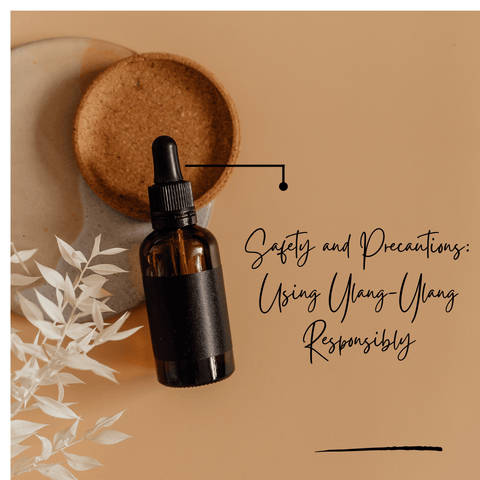
To protect your safety and maximise the benefits of Ylang-Ylang oil (Cananga odorata), it is critical to use it correctly. While Ylang-Ylang oil can be beneficial to the skin and mood, it is a powerful essential oil that must be handled and diluted properly. Here are a few crucial safety tips to remember:
-
Always Dilute Properly: Ylang-Ylang oil should never be applied directly to the skin in its undiluted form. Always dilute it with a carrier oil, lotion, or other appropriate skincare product. A common dilution ratio is around 1-2% Ylang-Ylang oil in a carrier oil for topical application.
-
Perform a Patch Test: Perform a patch test on a tiny, inconspicuous area of skin before applying Ylang-Ylang oil to a wider area. This allows you to assess whether or not you have any allergic reactions or sensitivities to the oil.
-
Avoid Sensitive Areas: Avoid applying Ylang-Ylang oil to sensitive areas such as the eyes, mucous membranes, and open wounds. If contact occurs by accident, immediately rinse with a carrier oil or water.
-
Use During Pregnancy and Nursing: Pregnant women and nursing moms should use Ylang-Ylang oil with caution. It is best to consult a healthcare expert before using essential oils, as some essential oils may be unsafe to use during pregnancy.
-
Allergies and Sensitivities: Individuals with documented allergies or sensitivities to floral essential oils or specific chemicals present in Ylang-Ylang oil should exercise caution. If you are unsure, conduct a patch test or visit a healthcare practitioner.
-
Interaction with Medications: Consult a healthcare provider before using Ylang-Ylang oil if you are taking drugs or have underlying health conditions. Certain drugs can interact with essential oils.
-
Avoiding Ingestion: Ylang-Ylang oil should not be consumed. Ingesting essential oils can be dangerous and result in adverse reactions.
-
Photosensitivity: Some essential oils, such as Ylang-Ylang, can make you more sensitive to sunlight. Avoid direct sun exposure for at least 12 hours after applying Ylang-Ylang oil to the skin.
-
Quality Matters: Use only high-quality, pure essential oils from reputable sources. Look for oils that are labeled as 100% pure and have undergone proper testing.
-
Consult a Professional: Before using Ylang-Ylang oil, consult a dermatologist, aromatherapist, or healthcare professional if you have any questions, concerns, or specific health conditions.
-
Less is More: When using Ylang-Ylang oil, keep in mind that a little goes a long way. Using excessive amounts may lead to skin sensitivities or overwhelming aromas.
-
Children and Pets: Use essential oils with extreme caution when around children and pets. Their bodies may react differently to essential oils, so it is best to consult an expert in these cases.
By taking these precautions and using Ylang-Ylang oil responsibly, you can reap the benefits of its potential for skin and mood enhancement without risking adverse effects.
Potential Side Effects of Ylang-Ylang Oil
While Ylang-Ylang oil (Cananga odorata) has many potential benefits, it is vital to be aware of potential side effects and precautions, especially if used incorrectly or in large quantities. Skin sensitivity and irritation, allergic reactions, headaches or nausea, photosensitivity, hormonal effects, drug interactions, pregnancy and breastfeeding, quality and purity, individual variations, and avoidance are some of the potential side effects and considerations associated with Ylang-Ylang oil.
Follow these guidelines to reduce the risk of side effects:
-
Before applying Ylang-Ylang oil to the skin, dilute it thoroughly.
-
Check for sensitivities by performing a patch test.
-
Use Ylang-Ylang oil sparingly and in accordance with the manufacturer's instructions.
-
If you have any health concerns, talk to your doctor before using Ylang-Ylang oil.
Always prioritise safety when using essential oils, and if you are unsure about using Ylang-Ylang oil, seek advice from a qualified aromatherapist or healthcare professional.
Safety Guidelines for Ylang-Ylang Usage
To avoid unwanted reactions and ensure a positive experience, use Ylang-Ylang oil (Cananga odorata) cautiously and responsibly. Here are some precautions to take when using Ylang-Ylang oil for cosmetics, aromatherapy, and other uses:
Dilution: Before using Ylang-Ylang oil on the skin, always dilute it. A typical dilution of Ylang-Ylang oil is 1-2% in a good carrier oil, lotion, or cream.
Patch Test: Apply a patch test to a small region of skin (e.g., inner forearm) with a diluted blend of Ylang-Ylang oil. Check for allergic reactions, sensitivities, or skin irritations after 24 hours.
-
Quality Assurance: Use high-quality, unadulterated Ylang-Ylang oil from recognised sources. Look for oils that are labeled as 100% pure and have been tested for quality and authenticity.
-
Avoid Contact with Eyes and Mucous Membranes: Apply Ylang-Ylang oil away from the eyes, inner ears, and mucous membranes. If contact occurs by accident, rinse with a carrier oil or water.
-
Photosensitivity Precautions: Ylang-Ylang oil can increase sensitivity to sunlight. Avoid sun exposure or UV rays for at least 12 hours after applying it to the skin.Use During Pregnancy and Nursing: Before using Ylang-Ylang oil, pregnant or nursing women should consult with a healthcare professional. Some essential oils are not recommended during these periods.
-
Allergies and Sensitivities: If you have a known allergy to floral essential oils or specific components present in Ylang-Ylang oil, proceed with caution and seek the advice of a healthcare expert if necessary.
- Inhalation Safety: Start with a modest amount of Ylang-Ylang oil in aromatherapy and see how your body reacts. If you get headaches, nausea, or discomfort, stop using it or lower the amount you're using.
- Storage: Store Ylang-Ylang oil in a cool, dark place away from direct sunlight and heat. Keep it out of the reach of children and pets.
- Avoid Ingestion: Ylang-Ylang oil is not meant to be ingested. Ingesting essential oils can lead to serious health risks.
- Consult Professionals: Consult a healthcare provider or a qualified aromatherapist if you have specific health conditions, are taking medications, or are unsure about using Ylang-Ylang oil.
- Start with Low Concentrations: If you are new to essential oils, start with lower dilutions of Ylang-Ylang oil. You can gradually increase the dilution based on your comfort and experience.
- Moderation is Key: While Ylang-Ylang oil has potential benefits, overuse can cause sensitization or overpowering aromas. Use essential oils sparingly.
- Avoid Synthetic Fragrances: Choose Ylang-Ylang oil from reputable sources and avoid products with artificial fragrances or additives.
By following these precautions, you can reap the benefits of Ylang-Ylang oil while reducing the chance of unwanted reactions or allergies. If you have any questions or concerns, please seek the counsel of trained aromatherapy or healthcare professionals.
Embracing Ylang-Ylang: Uplifting Mood and Boosting Skin Health
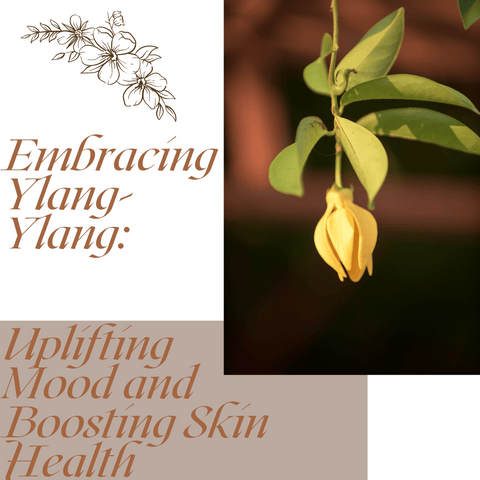
With its alluring scent and various characteristics, Ylang-Ylang (Cananga odorata) essential oil has captivated the worlds of aromatherapy and cosmetics. Ylang-Ylang provides a holistic approach to well-being, from its ability to raise the mood to its potential for improving skin health. Let's look at how this precious oil can boost your mood and produce gorgeous skin.
Uplifting Mood with Ylang-Ylang: Ylang-Ylang's floral, sweet, and exotic perfume has the ability to calm the mind and lift the spirit. Here's how it does its thing:
-
Mood Enhancement: Inhaling the perfume of Ylang-Ylang might cause the production of neurotransmitters such as serotonin and endorphins, which encourage feelings of enjoyment and relaxation.
-
Stress Reduction: The calming properties of Ylang-Ylang can help lower cortisol levels, reducing stress and anxiety. Diffusing the oil or using it in massage can help to create a relaxing atmosphere.
-
Aphrodisiac Effects: The sensual scent of Ylang-Ylang is known to arouse romantic feelings. It has the potential to improve intimacy and emotional connections.
-
Mindful Rituals: Incorporating Ylang-Ylang into daily rituals like baths, massages, or meditation can help you practice self-care and awareness.
- Boosting Skin Health with Ylang-Ylang: The benefits of Ylang-Ylang go beyond emotions, providing benefits for skin health as well:
-
Balancing Sebum Production: Ylang-Ylang has the ability to regulate sebum production, making it suitable for both oily and dry skin types. It promotes a healthy complexion.
-
Hydration and Nourishment: Including Ylang-Ylang in skincare products can boost hydration and nourishment, leaving skin soft and supple.
-
Skin Cell Regeneration: The regenerative properties of Ylang-Ylang can aid in the renewal of skin cells, promoting a youthful appearance.
-
Antioxidant Protection: The antioxidants in the oil protect the skin from environmental stressors and free radicals that cause premature aging.
-
Cleansing and clarifying: Ylang-Ylang can be used in facial cleansers and masks to purify and clarify the skin, promoting a radiant complexion.
-
Soothing Irritation: Because of its calming properties, Ylang-Ylang oil is effective in soothing irritated or inflamed skin.
Future Trends: Ylang-Ylang in Skincare Innovation
Based on historical patterns and market movements, we can provide some insights into potential Ylang-Ylang trends in skincare innovation. Remember that these are speculative and should be confirmed with more recent sources:
-
Holistic Skincare Formulations: Ylang-Ylang may find its way into more formulas that emphasise a well-rounded approach to skin health as the demand for natural and holistic skincare grows. Brands may include Ylang-Ylang in cosmetics that emphasise not just the physical health of the skin but also its mental well-being.
-
Customised and Personalised Skincare: The popularity of personalised skincare is expected to grow. Because of its adaptability, ylang-ylang could be a desired ingredient in custom-made skincare solutions that target specific skin conditions while giving aromatherapeutic advantages based on personal preferences.
-
Multi-Benefit Products: Consumers are increasingly interested in multi-functional products that provide skincare advantages as well as sensory experiences. The potential of Ylang-Ylang to raise mood and improve skin health corresponds well with this trend, and we may see it used in more products that cater to both elements.
-
Sustainable and Ethical Sourcing: As the emphasis on sustainability and ethical sourcing grows, brands may focus on procuring Ylang-Ylang oil in a sustainable manner to benefit local communities and protect the environment where it is grown.
-
Incorporation into Traditional Practises: As interest in traditional wellness practices such as aromatherapy and Ayurveda grows, the historical use of Ylang-Ylang in these practices could drive innovation in skincare products that align with these holistic philosophies.
-
Focus on Emotional Well-Being: The mood-enhancing properties of ylang-ylang may lead to its incorporation into products designed to combat the negative effects of stress and promote emotional well-being through skincare routines.
-
Combination with Other Natural Ingredients: Combinations of Ylang-Ylang with other natural ingredients known for skin-loving benefits, such as hyaluronic acid, antioxidants, and botanical extracts, may become popular for comprehensive skincare solutions.
-
Aromatherapeutic Skincare Rituals: More brands may introduce skincare products that promote self-care rituals by incorporating the aromatherapeutic effects of Ylang-Ylang. This could include step-by-step routines that promote relaxation and emotional balance.
-
Transparency and Education: Brands may invest in educating consumers about the benefits of Ylang-Ylang and how to use it correctly, while also encouraging transparency about ingredient sourcing and formulation processes.
-
Research and Clinical Studies: The potential benefits of Ylang-Ylang for skin health and emotional well-being may prompt more research and clinical studies, providing scientific validation for its efficacy in skincare.
Remember that trends in the skincare industry can shift quickly, influenced by customer preferences, scientific breakthroughs, and cultural shifts. If you're looking for the most recent Ylang-Ylang skincare advances, you should look into recent industry reports, skincare specialists, and renowned beauty journals.
Final Thoughts: The Versatility and Power of Ylang-Ylang
Ylang-Ylang (Cananga odorata) essential oil is truly extraordinary, with incredible adaptability and strength. Its fragrant profile, long history, and several benefits make it a prized element in aromatherapy and skincare. Ylang-Ylang has a lot to offer if you want to improve your mood, improve your skincare routine, or generate a holistic sense of well-being. Aromatherapeutic elevation, fostering skin health, a holistic approach, a loving companion, an ode to nature, personalised routines, and respect and care are some last comments on the variety and power of Ylang-Ylang. Ylang-Ylang is more than just an oil; it's an invitation to reconnect with yourself, to enjoy nature's gifts, and to indulge in moments of self-care and mindfulness. Allow the variety and strength of Ylang-Ylang to enrich your life, both inside and out, as you explore its world.








































